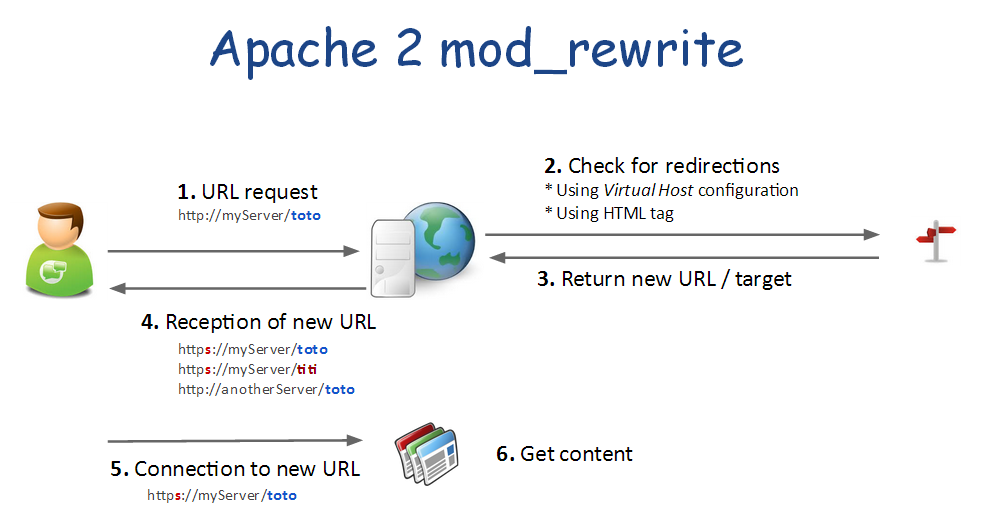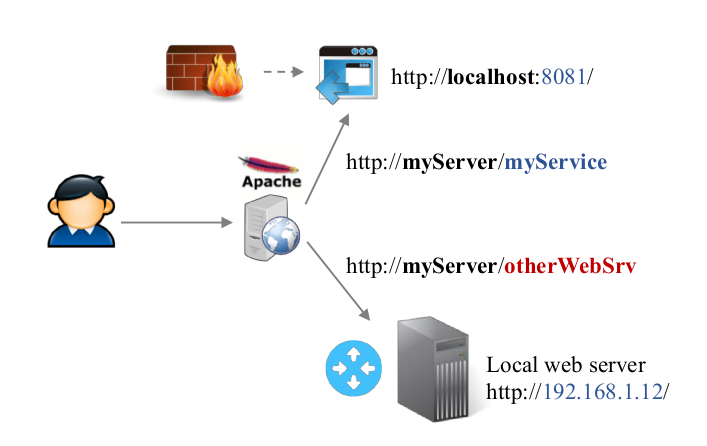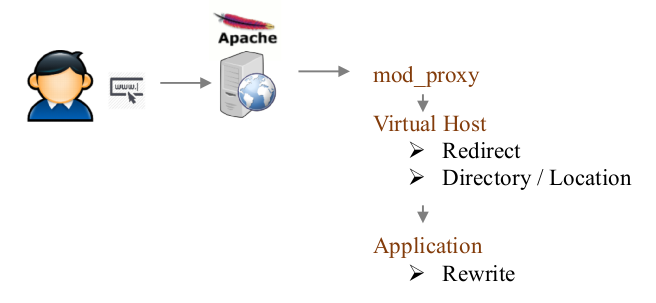Apache 2 - Redirection (mod rewrite)
Contents
Redirections
Principle
Just a little reminder...
- Redirections are not transparent
- Redirections are performed by the client. The server only serves the new URL to use
- Redirections can also be used as a security tool to filter HTTP requests and only allow some of them.
As you can see on the previous picture, redirection can be declared:
- As Apache 2 module configuration. This will apply to all virtual hosts and web-sites
- In a Virtual Host configuration
- Default setting - ex: HTTP to HTTPS
- For a specific alias |or| directory
- In a web page
- In a .htaccess to protect a specific directory
Enable redirections
Module "rewrite" allows you to redirect source URL to another one.
a2enmod rewrite
Virtual host: redirect all HTTP to HTTPS
The safer way to redirect HTTP to HTTPS is use to adjust the virtual host configuration.
<VirtualHost *:80>
ServerName dev.daxiongmao.eu
ServerAlias www.dev.daxiongmao.eu *.dev.daxiongmao.eu
ServerAdmin guillaume@qin-diaz.com
### LOG ###
LogLevel warn
ErrorLog ${APACHE_LOG_DIR}/dev.daxiongmao.eu/error.log
CustomLog ${APACHE_LOG_DIR}/dev.daxiongmao.eu/access.log combined
############################################
## Redirect all traffic to HTTPS website
############################################
RewriteEngine On
# This checks to make sure the connection is not already HTTPS
RewriteCond %{HTTPS} off
# This rule will redirect users from their original location, to the same location but using HTTPS.
RewriteRule (.*) https://%{HTTP_HOST}%{REQUEST_URI}
# Alternate (fail-over) solution
redirect permanent / https://myServer/
########
# No need of a document root anymore as everything is redirect to HTTPS
########
</VirtualHost>
-Note-
As you can see you don't need a DocumentRoot anymore for the *:80 virtual host.
Take changes into account
You have to restart the server to use this settings
service apache2 restartTest your configuration
Virtual host: Alias redirection
The following example will redirect a "/phpsecinfo" from HTTP to HTTPS.
Edit your virtual-host configuration and use that example to redirect to another server too by adjusting the rewrite rule.
<VirtualHost *:80>
...
# PHPSecInfo
RewriteRule ^/phpsecinfo(/.*|$) https://%{HTTP_HOST}/phpsecinfo$1 [L,R]
<Location /phpsecinfo>
order deny,allow
deny from all
# Only allow specific IP@
# allow from 127.0.0.1 192.168.1.0/24
allow from all
</Location>
...
</VirtualHost>
<VirtualHost *:443>
...
# PHPSecInfo
Alias /phpsecinfo /var/www/phpsecinfo
<Location /phpsecinfo>
order deny,allow
deny from all
# Only allow specific IP@
# allow from 127.0.0.1 192.168.1.0/24
allow from all
</Location>
...
</VirtualHost>
Reload your configuration
/etc/init.d/apache2 reload
Apache 2 Module configuration
This configuration will apply to all virtual-hosts.
Create the module configuration file
vim /etc/apache2/mods-available/rewrite.conf
Copy / paste this configuration (adjust to your own settings!)
RewriteEngine On
# --------------------- SECURITY RULES (JOOMLA) ------------------------ #
## End of deny access to extension xml files
RewriteCond %{QUERY_STRING} mosConfig_[a-zA-Z_]{1,21}(=|\%3D) [OR]
# Block out any script trying to base64_encode crap to send via URL
RewriteCond %{QUERY_STRING} base64_encode.*\(.*\) [OR]
# Block out any script that includes a <script> tag in URL
RewriteCond %{QUERY_STRING} (\<|%3C).*script.*(\>|%3E) [NC,OR]
# Block out any script trying to set a PHP GLOBALS variable via URL
RewriteCond %{QUERY_STRING} GLOBALS(=|\[|\%[0-9A-Z]{0,2}) [OR]
# Block out any script trying to modify a _REQUEST variable via URL
RewriteCond %{QUERY_STRING} _REQUEST(=|\[|\%[0-9A-Z]{0,2})
# Send all blocked request to homepage with 403 Forbidden error!
RewriteRule ^(.*)$ index.php [F,L]
# --------------------- SECURITY RULES (PERSONAL) ------------------------ #
## DENY REQUEST BASED ON REQUEST METHOD ###
RewriteCond %{REQUEST_METHOD} ^(TRACE|TRACK|OPTIONS|HEAD)$ [NC]
RewriteCond %{REQUEST_METHOD} (GET|POST) [NC]
RewriteRule ^.*$ - [F]
# Avoid common security flows
RewriteCond %{QUERY_STRING} ^(.*)http(\:|\%3A)(.*)$
RewriteCond %{QUERY_STRING} mosConfig_ [NC,OR]
RewriteCond %{QUERY_STRING} ^(.*)(%3C|<)/?script(.*)$ [NC,OR]
RewriteCond %{QUERY_STRING} ^(.*)(%3D|=)?javascript(%3A|:)(.*)$ [NC,OR]
RewriteCond %{QUERY_STRING} ^(.*)document\.location\.href(.*)$ [NC,OR]
RewriteCond %{QUERY_STRING} ^(.*)base64_encode(.*)$ [NC,OR]
RewriteCond %{QUERY_STRING} ^(.*)GLOBALS(=|[|%[0-9A-Z]{0,2})(.*)$ [NC,OR]
RewriteCond %{QUERY_STRING} ^(.*)_REQUEST(=|[|%[0-9A-Z]{0,2})(.*)$ [NC,OR]
RewriteCond %{QUERY_STRING} ^(.*)(SELECT|INSERT|DELETE|CHAR\(|UPDATE|REPLACE|LIMIT)(.*)$
# Avoid common security mistakes
RewriteCond %{QUERY_STRING} \.\.\/ [NC,OR]
RewriteCond %{QUERY_STRING} boot\.ini [NC,OR]
RewriteCond %{QUERY_STRING} tag\= [NC,OR]
RewriteCond %{QUERY_STRING} ftp\: [NC,OR]
RewriteCond %{QUERY_STRING} http\: [NC,OR]
RewriteCond %{QUERY_STRING} https\: [NC,OR]
RewriteCond %{QUERY_STRING} mosConfig [NC,OR]
RewriteCond %{QUERY_STRING} ^.*(\(|\)|<|>|'|"|\?|\*).* [NC,OR]
RewriteCond %{QUERY_STRING} ^.*(%22|%27|%3C|%3D|%3E|%7B|%7C).* [NC,OR]
RewriteCond %{QUERY_STRING} ^.*(%0|%A|%B|%C|%D|%F|127\.0).* [NC,OR]
RewriteCond %{QUERY_STRING} ^.*(globals|encode|localhost|loopback).* [NC,OR]
RewriteCond %{QUERY_STRING} ^.*(select|insert|union|declare|drop).* [NC]
RewriteRule ^(.*)$ - [F,L]
# Ban Typical Vulnerability Scanners and others
# Kick out Script Kiddies
RewriteCond %{HTTP_USER_AGENT} ^(java|curl|wget).* [NC,OR]
RewriteCond %{HTTP_USER_AGENT} ^.*(libwww-perl|curl|wget|python|nikto|wkito|pikto|scan|acunetix).* [NC,OR]
RewriteCond %{HTTP_USER_AGENT} ^.*(winhttp|HTTrack|clshttp|archiver|loader|email|harvest|extract|grab|miner).* [NC,OR]
# Avoid zombies software
RewriteCond %{HTTP_USER_AGENT} ^Anarchie [OR]
RewriteCond %{HTTP_USER_AGENT} ^ASPSeek [OR]
RewriteCond %{HTTP_USER_AGENT} ^attach [OR]
RewriteCond %{HTTP_USER_AGENT} ^autoemailspider [OR]
RewriteCond %{HTTP_USER_AGENT} ^Xaldon\ WebSpider [OR]
RewriteCond %{HTTP_USER_AGENT} ^Xenu [OR]
RewriteCond %{HTTP_USER_AGENT} ^Zeus.*Webster [OR]
RewriteCond %{HTTP_USER_AGENT} ^Zeus
RewriteRule ^.* - [F,L]
# Allow the robots to reference our website
RewriteCond %{HTTP_USER_AGENT} !^Googlebot [NC]
RewriteCond %{HTTP_USER_AGENT} !^Googlebot-Image [NC]
RewriteCond %{HTTP_USER_AGENT} !^Googlebot-Mobile [NC]
RewriteCond %{HTTP_USER_AGENT} !^Msnbot [NC]
RewriteCond %{HTTP_USER_AGENT} !^Mediapartners-Google [NC]
# Keep request without referer
RewriteCond %{HTTP_REFERER} !^$
# To allow your pictures to be displayed on Google
RewriteCond %{HTTP_REFERER} !^http://.*google\.(comŠ(co\.)?[a-z]{2})/
# To forbid the copy of your pictures to anyone else : display an other image !
RewriteRule .*\.(jpe?g|gif|bmp|png)$ /images/hotlinkis.jpg [L]
Update your Apache2 configuration:
a2enmod rewrite
Restart your server:
service apache2 restart
Proxy
Special thanks to Julien Rialland for his insight regarding this part!
Principle
The proxy module allow you to expose a resource that is not directly accessible.
For instance it can redirect remote user to a specific server that can be host on a different machine or port through a simple URL.
Proxy VS redirection
| Header text | Proxy | Redirection |
|---|---|---|
| Main usage |
|
Signal a change or redirect to the HTTPS web-site |
| Action | Hidden to the user.
|
Explicit
|
Internet limits: why do we need a proxy?
Some application are not available from outside…
- For security reasons [default URL is not allowed]
- Due to network issues
How does Apache2 mod_proxy work?
The Apache2 proxy module allow you to provide access through transparent redirection.
It relies on:
- Already open port (80 or 443)
- Redirection rule
- Each service URL must be unique
- The target service must be reachable by the web server
As you can see on the previous example, the services will be accessible using some dedicated URL.
Remote “http://myServer/myService” will redirect to “http://localhost:8081”
→ The mod_proxy is none intrusive.
You don’t have to change anything in the original service configuration. Apache2 will handle all the transformations.
Proxy / redirect / rewrite - HTTP request processing
When Apache2 receive a request it will be process in the following order:
The evaluation order is:
- Mod_proxy
- Mod_rewrite
- Other modules
- Serve requested resources if no rule should apply
So, even if you enable a full redirection to HTTPS you can still use some HTTP service through mod_proxy (because mod_proxy is the 1st to be evaluate).
Installation
Enable proxy module
a2enmod proxy proxy_http proxy_ajp
a2enmod proxy_html xml2enc
Configure proxy redirections
You can configure the redirections in 2 ways:
- Through your virtual host configuration
- Through the module configuration file
Module configuration file
You have to edit / create the configuration file.
vim /etc/apache2/mods-enabled/proxy.conf
Virtual host
Just edit again your previous V.Host:
vim /etc/apache2/sites-available/myServer.conf
V.Host proxy declaration
Adjust your V.Host configuration to:
<VirtualHost *:80>
ServerName dev.daxiongmao.eu
ServerAlias www.dev.daxiongmao.eu *.dev.daxiongmao.eu
ServerAdmin guillaume@qin-diaz.com
### LOG
LogLevel warn
ErrorLog ${APACHE_LOG_DIR}/dev.daxiongmao.eu/error.log
CustomLog ${APACHE_LOG_DIR}/dev.daxiongmao.eu/access.log combined
### Redirect all traffic to HTTPS website
RewriteEngine On
RewriteCond %{HTTPS} off
RewriteRule (.*) https://%{HTTP_HOST}%{REQUEST_URI}
redirect permanent / https://myServer/
### No proxy here because I only want to use HTTPS
</VirtualHost>
<VirtualHost *:443>
...
#############################
# Proxy configuration
#############################
# Enable proxy
ProxyVia On
ProxyPreserveHost On
ProxyRequests Off
ProxyErrorOverride Off
## SSL support (allow to redirect to other SSL sites)
SSLProxyEngine On
SSLProxyVerify none
SSLProxyCheckPeerCN off
SSLProxyCheckPeerName off
<Proxy *>
AddDefaultCharset off
Order deny,allow
Allow from all
Satisfy Any
</Proxy>
########################
# Standard Web application - No proxy required
########################
#### Direct access without further configuration
ProxyPass /maintenance !
ProxyPass /menu !
ProxyPass /ssl !
#### Standard URL filters
# PhpMyAdmin
<Location /phpmyadmin>
Require all granted
ProxyPass !
Order allow,deny
Allow from 127.0.0.1 192.168.1.0/24
</Location>
#### Alias
# PHPSecInfo
Alias /phpsec /var/www/phpsecinfo
<Location /phpsec >
Require all granted
ProxyPass !
order deny,allow
# allow from 127.0.0.1 192.168.1.0/24
allow from all
</Location>
########################
# Proxy redirections
########################
# Proxy to a Java application running over Tomcat
ProxyPass /webdav ajp://localhost:8009/webdav/
ProxyPassReverse /webdav ajp://localhost:8009/webdav
# Proxy to a Java application running over Tomcat, with IP filter
<Location /manager>
Order allow,deny
Allow from 127.0.0.1 192.168.1.0/24 193.12.118.196
ProxyPass ajp://localhost:8009/manager/
ProxyPassReverse ajp://localhost:8009/manager/
</Location>
# Proxy to another server
ProxyPass /jira http://192.168.1.12:8080/jira
ProxyPassReverse /jira http://192.168.1.12:8080/jira
## Proxy to webmin
<Location /webmin/>
ProxyPass http://localhost:10000/
ProxyPassReverse http://localhost:10000/
Order deny,allow
Deny from all
Allow from 127.0.0.1 172.16.50.0/24 192.168.1.0/24
</Location>
## Proxy to RabbitMQ
<Location /rabbitmq/>
ProxyPass http://smartcard-mq:15672/
ProxyPassReverse http://smartcard-mq:15672/
Order deny,allow
Deny from all
Allow from 127.0.0.1 172.16.50.0/24 192.168.1.0/24
</Location>
</VirtualHost>
Some notes:
- Do NOT put a / after the target URL
- Do NOT use / as ProxyPass source, use the previous redirect permanent instead
Apply changes and test result
service apache2 restart
For example, Navigate to http://myServer/jira




